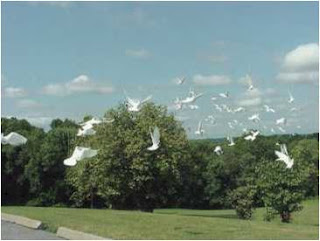Turning sixty has made me stop and think.
I've been thinking about everything that’s happened in my life so far: the things I’ve done, the things I wish I’d done, and the things I wish I hadn’t done. I'm aware that it’s getting to be a bit late to do much to change all that. Time is beginning to run out. I've got a lot more past than future. I haven’t the energy I used to have. My body is starting to crumble, and I know that’s only going to get worse – tinnitus, restless legs, prostate problems, and now the dreaded bowel screening tests. Eeugh!
Except it doesn’t feel like that to me.
It feels remarkably good.
That’s partly because I’ve got a wonderful family and lots of good friends, who helped me celebrate my 60th birthday in grand style.
And it’s partly because things have generally gone well for me in recent years.
But it’s more, much more than that.
I'm coming to realise that I don’t have to try quite so hard any more. That it’s OK to take everything a bit easier. That it’s fine to do less, and be more.
The Victorian poet Robert Browning starts off his wonderful poem Rabbi Ben Ezra like this:
Grow old along with me!
The best is yet to be...
The best is yet to be...
He’s not talking about everything being a major success, or looking at the world through rose-tinted glasses. He’s thinking about past failures, and how they really don’t matter – What I aspired to be/ And was not, comforts me. It’s not a problem, he says, it’s OK to have made a pig’s ear of things.
I know what he means. Whether things up to now have gone well, or not so well – or even if they’ve been disastrous - there is something reassuring about time moving on. The past is in the past. We can allow ourselves to leave it there. We don’t need to dwell on it. And we can look forward to different ways of being.
I’m confident that the next twenty years are going to be the best so far. Growing old looks good to me. Not worrying about getting anywhere in particular, just enjoying being where I am. Less hassle - and a lot more fun.
I’m not naive about this. I know everything could go belly up, any time. Like it did for John Lennon – who ironically used Browning’s poem as the basis of one of his very last songs ‘Grow old along with me’ (you can find it on http://www.youtube.com/watch?v=oixKjpZ5a1o) - just a few months before he was shot.
But that’s not the point. Not at all.
It’s all about living hopefully.












